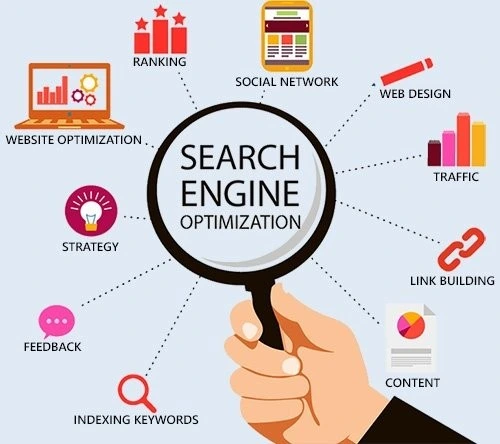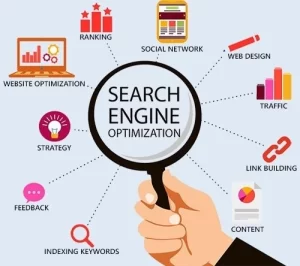
SEO’s Role in Digital Marketing
In today’s digital landscape, businesses rely on effective online strategies to attract and retain customers. Search Engine Optimization (SEO) is a fundamental component of digital marketing that helps businesses enhance their online visibility, drive organic traffic, and improve conversion rates. This guide explores the critical role of SEO in digital marketing and why it is essential for business success.

1. Understanding SEO in Digital Marketing
SEO is the process of optimizing a website to rank higher on search engine results pages (SERPs). It involves various strategies, including keyword optimization, technical SEO, content creation, and link building. A well-executed SEO strategy ensures that businesses attract their target audience and gain a competitive edge in the digital space.
2. How SEO Supports Digital Marketing Efforts
SEO plays a vital role in digital marketing by complementing other strategies such as content marketing, social media marketing, and paid advertising. Here’s how:
- Increases Organic Traffic: SEO helps businesses attract visitors without the need for paid advertisements.
- Enhances User Experience (UX): Google rewards websites that offer fast load times, mobile responsiveness, and easy navigation.
- Boosts Brand Credibility: Higher search rankings build trust and authority, making customers more likely to engage with your brand.
- Improves Content Performance: SEO-optimized content reaches the right audience and drives engagement.
- Supports PPC Campaigns: SEO and Pay-Per-Click (PPC) advertising work together to maximize visibility and conversion rates.
3. Key Elements of an Effective SEO Strategy
To leverage SEO for digital marketing success, businesses must focus on the following elements:
- On-Page SEO: Optimizing individual pages with relevant keywords, meta tags, and high-quality content.
- Technical SEO: Enhancing website structure, improving load speed, and ensuring mobile-friendliness.
- Off-Page SEO: Building backlinks and improving domain authority through link-building strategies.
- Local SEO: Optimizing for local searches and managing Google Business Profile listings.
- Analytics & Monitoring: Tracking performance metrics and making data-driven improvements.
4. SEO Trends in 2025
SEO is constantly evolving, and staying ahead of trends is crucial for success. Here are some key trends shaping SEO in 2025:
- AI and Machine Learning: Search engines are using AI to refine search results, making content relevance more important than ever.
- Voice Search Optimization: More users rely on voice search, requiring businesses to optimize for conversational queries.
- Video SEO: Video content is growing in popularity, and optimizing for YouTube and other platforms is essential.
- Core Web Vitals: Google prioritizes user experience metrics, emphasizing fast load times and seamless navigation.
- E-E-A-T (Experience, Expertise, Authoritativeness, Trustworthiness): Google’s ranking system rewards websites that demonstrate expertise and credibility.
Conclusion
SEO is an indispensable part of digital marketing that ensures businesses remain visible and competitive online. By implementing a strong SEO strategy, businesses can drive organic traffic, improve brand credibility, and increase conversions. Whether you’re a startup or an established enterprise, investing in SEO will help you achieve long-term success in the digital world.
